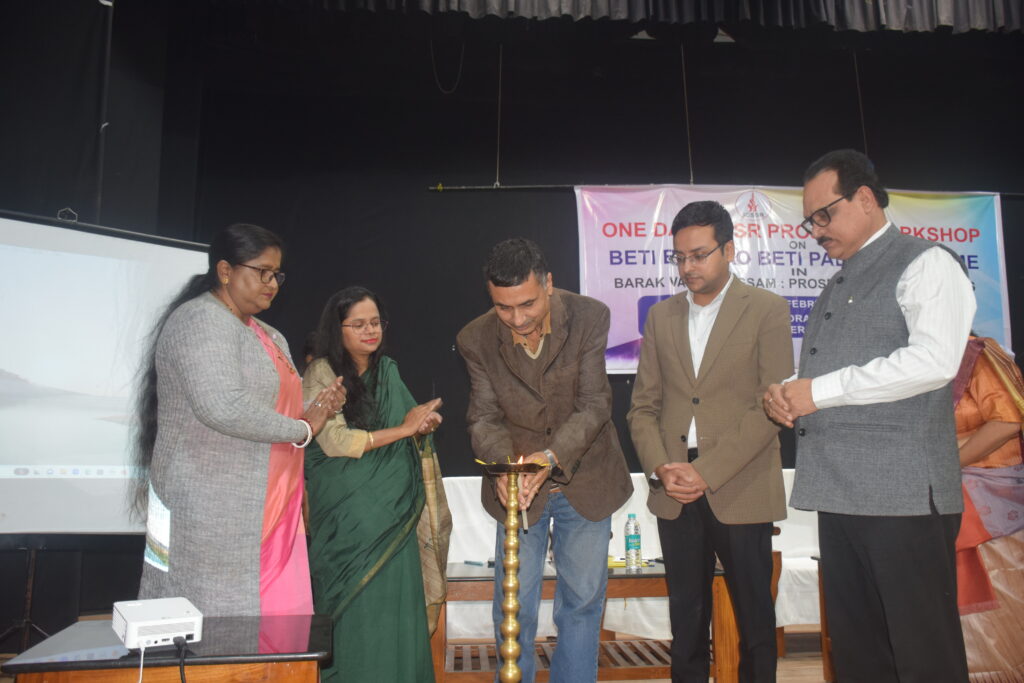Barak UpdatesHappeningsBreaking News
Dr. Kannan Urges Children to Avoid Sedentary Lifestyle, Highlights Importance of Sexual Hygiene
Workshop on "Beti Bachao Beti Padhao" at Assam University

way2barak, Feb 15 : “We have observed an early onset of the first menstrual period among many young girls. This is attributed to their lack of participation in outdoor sports or regular exercise, their consumption of junk foods, and their intake of sugar-sweetened beverages, among other factors. The early onset of menstruation may lead to various health problems later in a woman’s life,” said Dr. R. Ravi Kannan, a surgical oncologist and recipient of both the Padma Shri and the Ramon Magsaysay Award.
During his address at the one-day workshop on the prospects and challenges of the “Beti Bachao Beti Padhao” (BBBP) scheme, held at Assam University, Silchar, on Tuesday, Dr. Kannan, the Director of the Cachar Cancer Hospital and Research Centre, expressed concern over the rising incidence of breast cancer, ovarian cancer, cervical cancer, and uterine cancer among women. He emphasized the importance of maintaining sexual hygiene among women as a preventive measure against different kinds of cancers.
Kannan urged people to eliminate habits such as alcohol and tobacco consumption and smoking and to adopt a healthier lifestyle to prevent such diseases.

Organised by Assam University, Silchar, as part of an ICSSR (Indian Council of Social Science Research) project initiative, the workshop saw the participation of academicians, researchers, government officials, social workers, representatives from non-governmental organisations, Accredited Social Health Activists, Anganwadi workers, and students from various parts of the valley.
Madhumita Dhar Sarkar, professor in the Department of Law at Assam University and the Project Director, shared her experience of visiting villages to assess the prospects and challenges of implementing the BBBP scheme in the three districts of Barak Valley – Cachar, Karimganj, and Hailakandi.
She said, “I feel that women in the Barak Valley region are more empowered than in many other parts of the country. The enrollment of girl children in schools in rural areas is good.”
She pointed out that “child marriage is one of the biggest menaces” she encountered during the research for the project.
She highlighted the district administration’s initiatives to address child marriage and emphasised the importance of creating awareness among the rural population to opt for smaller families.
The Government of India launched the “Beti Bachao Beti Padhao” scheme to prevent female foeticide and sex determination, ensure safety and save all female children, and provide them with quality education.
Asoke Kumar Sen, Vice Chancellor incharge and Professor in the Department of Physics at Assam University, underscored the significance of such workshops in facilitating dialogue and cooperation among stakeholders towards achieving the objectives of the BBBP scheme. He emphasised the university’s commitment to promoting gender equity and contributing to societal development through academic research and community engagement.
Dr. Khaleda Sultana Ahmed, Additional Deputy Commissioner of Cachar, highlighted various initiatives of the district administration as part of the “Beti Bachao Beti Padhao” scheme. She stated that the district administration is actively working towards declaring villages as “zero-child marriage” zones to set an example and encourage others to follow suit.
Among others who spoke at the inaugural ceremony of the workshop were Professor Baby Puspa Sinha, Dean of the School of English and Foreign Language Studies at Assam University, Silchar; Rashmi Ranjan Mishra, Dean of the School of Legal Studies at Assam University, Silchar; and Kabita Sengupta, Principal of Public Higher Secondary School, Silchar; Anand Malhotra, Assistant Commissioner of Cachar district.
All the workshop participants expressed optimism about leveraging collective action to overcome challenges and create an enabling environment for the holistic development of girls and women in the region.




